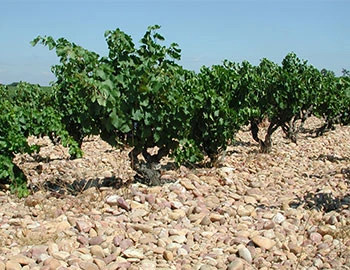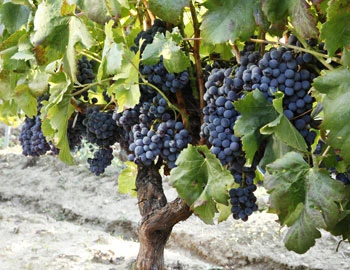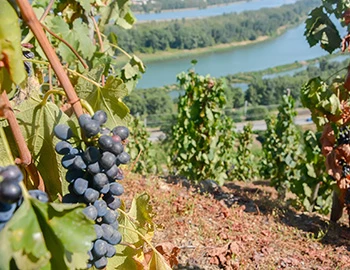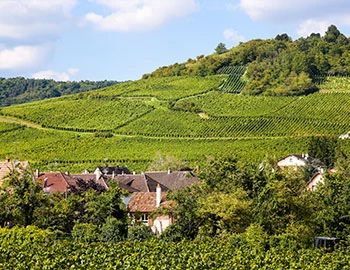
Héritage 2019
AC Châteauneuf-du-Pape, Pères de l'Eglise, 750 ml

| Grape variety: | Grenache |
| Producer: | Domaine des Pères de l'Eglise |
| Origin: | France / Rhône / Châteauneuf-du-Pape |
Description
A lush bouquet of roses and wisteria, mint and sour cherries reveals itself. After aeration, there are nuances of cranberries, sun-dried tomatoes and leather. On the palate, the Héritage captivates with its smoothness and elegance. Fine, polished tannins and secondary aromas of cranberry, sour cherry and roasted aromas make the wine even more complex. A very fine and well-balanced wine with a long finish and great potential.
Attributes
| Origin: | France / Rhône / Châteauneuf-du-Pape |
| Grape variety: | Grenache |
| Ripening potential: | 3 to 15 years |
| Drinking temperature: | 16 to 18 °C |
| Food Pairing: | Wild specialities, Bistecca fiorentina, T-Bone steak, Spiced grillades, Roasted lamb gigot, Saddle of lamb fillet with herb jus |
| Vinification: | partly destemmed, long must fermentation, fermentation in wooden barrel |
| Harvest: | hand-picking, selecting the grapes (by hand) |
| Maturation: | in large wooden barrel/foudre |
| Maturation duration: | 18 months |
| Volume: | 15.0 % |
| Note: | Contains sulphites |
Domaine des Pères de l'Eglise
In 1933, the winegrowers and wine merchants of Châteauneuf-du-Pape were the first to impose quality rules relating to the cultivation and production of wines that would bear the name Châteauneuf-du-Pape. The geographic definition of the cultivation area, along with the other regulations, is still in force today, in order to guarantee the wine quality for connoisseurs. The Gradassi family of the Domaine des Pères de l’Église is following the tradition, but with the fresh impetus provided by the young fourth generation.
The fourth generation is represented by Laetitia, who after completing a course in business studies spent two years in Australia and New Zealand, in order to gather experience in wineries there. In 2014, she joined her father and uncle in the family wine estate. However, following her father’s unexpected death, she soon had to assume responsibility for the cellar. Her uncle, Serge Gradassi, predominantly takes care of work in the vineyard.
Since 2001, the best wines have been bottled under their own domaine name. Before then, the wine was sold directly to the trade. The family owns 19 hectares, of which approximately 15 are split into numerous plots spread across the entire Châteauneuf-du-Pape region. Unbelievably, the average age of the vines is 80 years. The family even owns a vineyard which, in 1885, was planted by the great-grandfather as a mixed culture comprising all 13 grape varieties permitted under the appellation.

Grenache
Grenache seldom comes alone
Spaniards and Sardinians make the Grenache contentious: both claim it originated from their country. In fact, it had already appeared in both places by the 16th century. But a large number of mutations in Spain indicates that it has deeper roots on the Iberian Peninsula. The Grenache is meaty and spicy, with a wonderful, fruity sweetness and rich aromas of blackberry, cassis, plums and pepper. Under the name Garnacha, it contributes fullness to the Rioja. In Sardinia it is called Cannonau, where it yields strong, expressive wines. But its stronghold is in France. Grenache is the star in Châteauneuf-du-Pape and streams into many other assemblages from the south. Its preferred partners are Syrah and Mourvèdre. This blend is also very popular abroad. In Australia, these wines are simply called "GSM".

Rhône
Rhône: northern power, southern charm
The Rhône’s source is in Valais, and it flows into the Mediterranean 800 kilometres to the south. In the last 200 kilometres of its course, it is lined with vines which yield a range of red crus that are among the most prestigious wines in the world – for example, on the spectacular cliffs of the Hermitage Mountains, or in the gravelly terraces of Châteauneuf-du-Pape. The river valley, however, is also a rich source of characterful white wines and affordable, high-quality, everyday red wines.

France
France – Philosophy in a bottle
According to French philosophy, wine should be an expression of the soil and climate. They use the word “terroir” to describe this. Terroir makes every wine different, and many especially good. French wine is regarded worldwide as an expression of cultural perfection. The French believe that humans are responsible for the quality of the berries, the vine variety for their character, and nature for the quantity. This philosophy can be expressed succinctly as: “the truth is the vineyard, not the man.”


